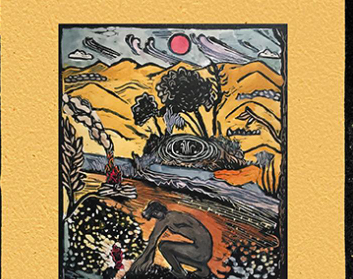Ceri Subbe reviews Delirium by Robert Minhinnick, a collection of short prose which considers a new world in the thick of pandemic, climate crisis and political upheaval.
The Royal College of Psychiatry defines delirium as ‘a state of mental confusion that starts suddenly and is caused by a physical condition of some sort. You don’t know where you are, what time it is, or what’s happening to you.’ Reading multi-award-winning poet Robert Minhinnicks’ book of short prose Delirium certainly induces in the reader some of the emotional and perceptual disturbances that are symptomatic of the condition. The text is principally concerned with memory, both personal and familial, collective and national, and the surreal presence of these memories in the present-day context of a global pandemic and climate change. The clinical symptoms of delirium usually lift when the condition causing it gets better, however, in this case, modern life appears to be the root trigger, rendering humanity doomed to experience life in a perpetual state of disturbed attention and consciousness. Minhinnick makes the case for this misfortune in busy, fragmented prose, which is polyphonic in voice, time-bending in span, and a whirlwind to read.
The book is split into five tranches, opening with ‘Decima and Albert’, a dual narrative of the author’s father’s diary kept in Burma during WWII, and the present-tense account of Minhinnick’s efforts to communicate with his mother who is resident in a care home. The reader is immediately unsure which temporal thread they should occupy as the father is firmly in the past, the author in a surreal pandemic / UV-intense apocalypse present, and a mother who is untethered from both past and present:
Sometimes the visitor is an animal and sometimes the visitor is someone
she has seen or remembers from a past no-one else can share and
sometimes the visitor has the wrong name and sometimes there is no-one
there when she says the visitor has arrived and sometimes I look into
her eyes and wonder who is this looking back at me…
The book continues in the shape of ‘The Extinction Circus’, a trip to the fairground in Porthcawl. Fairgrounds are liminal literary spaces where the normal rules of day-to-day life are suspended so that frequenters can immerse themselves in a magical realm, and Minhinnick succeeds in discombobulating the reader. However, masks, hygiene stations and hand sanitizers all root the narrative in the current pandemic and renders the experience somewhat less fantastical. During this section the author is also clearing out the family home, cataloguing, burning, throwing out recollections – surrendering memory to forgetting. This jump from childhood fairground to the sober adult experience of tying up loose ends at the end of one’s parents’ life is an effective slippage in the experience of time.
The next section titled ‘Billionaire’s Shortbread’ is, as the confection, a multi-layered approach to remembering. Flooded coastlines in north Africa, extinct exotic species, a malaria breakout and fossils all lend themselves to the phenomenon of climate crisis, but more poignantly, potions, spells and magic which are used to treat fevers have been wiped out. The use of magical realism gives a magnetism to the narrative beyond geographical statistics which allures the reader to engage with historical layers in order to better understand the future.
The penultimate portion of the book, ‘Fellow Travellers’ dedicated to Jan Morris, is a genre-blended travel ghost story. Dead poets, Bedouin children, and ‘ghosts of Golan’ are some of the spirits of who’s narratives remain problematically stray. The author acknowledges the displacement of peoples as the human nightmare which lies at the crux of global unrest.
So many prayers but all is prey…seeing Damascus in the distance,
and its dust drifting like dreams of great poetry or a feast for a
returning son.
The book closes with a series of screenshots concerning ‘The Mother of All Battles, Iraq, 1991’, an unsettling and incomplete conclusion to a disorientating text.
Ultimately, reading Delirium is a demandingly baffling experience. The reader is taken through a series of historical cultural ruptures which form collective memory and identity, and a series of personal ruptures for the author which form his unstable sense of both exterior and interior self. The narrative is anchored in the present-day traumas of Covid and environmental volatility, and these may well be the cause of the pathology suggested in the title, a pathology which will not vanish until the root causes are addressed. Until then, we as a species will continue in a state of delirium, sleep-walking deeper into our self-made rupture. In his seminal text Memory, History, Forgetting Paul Ricoeur defines memory as ‘a struggle against forgetting’, and with this in mind, Delirium delivers on Ricoeurs’ idea that ‘the past is no longer the guarantor of the future: this is the principal reason for promoting memory as a dynamic field and as the sole promise of continuity’.
Delirium by Robert Minhinnick is available via Seren Books.











